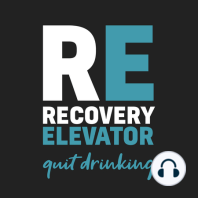38 min listen
RE 157: Don't Alcoholics Live Under Bridges?
ratings:
Length:
51 minutes
Released:
Feb 19, 2018
Format:
Podcast episode
Description
Many of the stereotypes surrounding alcoholism don't match up with reality. The image of the homeless guy holding the bottle in a brown paper bag and living under a bridge doesn't correctly represent the average alcoholic, despite the image's popularity. Recent data shows that only 3-5% of alcoholics are homeless or on the street. As a group, alcoholics have enhanced dopamine receptors. They tend to be overachievers, over-workers, over-thinkers, and over-creators. They come from many demographics and many age groups. When Paul compiled the data for the RE podcast, he wasn't surprised to find a diverse pool of listeners, both married and single, educated and uneducated, rich and poor. Kim, with less than 1 year since her last drink, shares her story: SHOW NOTES [12:42] Paul Introduces Kim. 5 months sober. From Buffalo NY, lives in Chicago, 36yo, works in digital marketing. Loves billiards, volleyball, spa and travel. Currently working towards a masters in digital communication. [15:00] When did you begin to realize you had a problem with alcohol? She fell ill and ended up in the hospital with a bleeding stomach. The doctor recommended that she quit. She quit briefly but ended up relapsing and found herself back in the hospital again. Second doctor also recommended sobriety. [18:40] What was it like when the second doctor told you it was life or death? The second doctor gave her lots of attention and encouraged her to get into AA. She was humbled and blown away by the personal touch. The doctor's previous patient was someone in the later stages of alcoholism and he warned her not to follow the same path. She then got 8 months of sobriety after. [20:27] Did you end up going to your first meeting? She did. She gave it a shot but it didn't feel like a good fit. She didn't connect with the people. [21:44] How did you come to relapse after the 8 month period? She took a trip to Mexico, and saw everyone around her drinking, which enabled her to justify having a few drinks. She decided she was treating herself. [22:40] How was the rest of the vacation? She didn't have any problems in Mexico, but she convinced herself that it wasn't a big deal and she opened the door to alcohol coming back in to her life. She gradually slipped back in to her old habits. [24:25] What happened after you begin to let alcohol back into your life? She spent a lot of time hungover. She spent a lot of money at IV ME [25:16] Were you sick and tired of being sick and tired? She was feeling run down and depressed. At this point she knew better and she was disappointed in herself. [26:20] During your Labor Day holiday, were you drinking by yourself? Yes. She felt left out and depressed. She doesn't remember doing her Fantasy Football League draft. [28:33] What was the next day like for you? She called an Uber, but made it turn around because she didn't feel up to it. Later that night she went to her therapist and he helped her see that she was choosing her behavior. [30:00] Were you fully honest with your therapist? Yes, he knew about her behavior. [30:42] Have you figured out why you were drinking? She thinks it's because she wants to fit in and be included. [33:33] What would you consider your rock bottom moment? Definitely in the hospital. Repeating the process, paying the money again even though she knew what the problem was. This time she wanted it to be different. She needed to know her other options. She ended up finding Smart Recovery. She began exploring other options she had never considered. She finally clicked with a sponsor and has even flown out to visit her in person. [36:27] What was the Dallas Cafe RE retreat like for you? She loved it. She found validation. It made her feel more comfortable. She found that there are other people just like her. [39:30] What are your thoughts on Smart Recovery? It's more science based. It focuses on thinking and behavi
Released:
Feb 19, 2018
Format:
Podcast episode
Titles in the series (100)
020: I didn't have to drink over that |Using alcohol to cope with life struggles: Dez, with 18 months of sobriety shares her experience by Recovery Elevator ?
